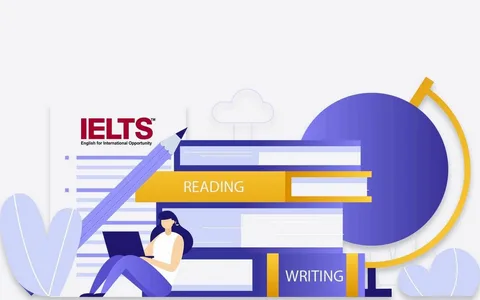A Comprehensive Guide for English Language Courses and IELTS Preparation
The exam used to measure English competence is called the International English Language Testing System, or IELTS. We’ll look at the best ways to be ready for the IELTS exam and the advantages of enrolling in an English study course. The exam is essential for people who wish to study or work in nations where English is the primary language. A manual.
Recognizing the Structure of the IELTS Exam
There are four main components to the IELTS exam: speaking, listening, reading, and writing. Every section assesses unique languages and skills, thus different preparation techniques will be needed for each.
Section for Listening
Four audio recordings make up the Listening Section. After each session, there are several questions about the recordings. The recordings consist of chats and monologues based on various scenarios; to succeed in this segment, it’s crucial to:
Engage in active listening by taking in English-language podcasts, films, and news.
Recognize and comprehend various accents Study up on various accents: The IELTS exam covers the various accents from America, Britain, Australia, and other English-speaking nations.
Test Preparation: Getting ready for the exam by simulating the exam environment with practice questions to hone time management and accuracy skills.
Section for Reading Three chapters make up the reading portion, which includes a variety of question types to complete, including matching and summary questions along with multiple choice questions.
Techniques for scanning and skimming The text’s most crucial concepts and elements are easy to identify. Expanding one’s vocabulary: Expand your vocabulary in English to improve your comprehension of complex literature. To enhance comprehension skills, practice reading passages regularly.
Composing Section
There are two distinct tasks in the Writing Section. Task 1 is to describe the data’s visual components (graphs or charts), and Task 2 is to write an essay.
Recognizing a task’s requirements: Every task has predetermined requirements that must be fulfilled to complete it effectively. Enhanced syntax and grammar English syntax must be used correctly at all times. Acquire essay writing skills: Essay writing activities will help you become a more persuasive and well-written writer.
Speaking Segment
The Speaking Section consists of three sections: a lengthy turn, a discussion, and an introduction/interview with the examiner. It is an in-person interview. Some suggestions for this section could be:
Enhanced fluency and pronunciation: Speak with assurance and clarity.
Increasing the Scope of Your Talks When you discuss the subjects in groups, be ready to cover a wide range of subjects. Creating speaking simulated tests: Use the tutor or a companion to practice speaking exams so you may receive helpful criticism on how you performed.
Advantages of Signing Up for an English Language Course
Enrolling in an English language course can help you prepare better for the IELTS by offering professional training and advice. Here are a few advantages:
Curriculum Structured
An English course provides a structured curriculum that covers all facets of IELTS exam preparation and advances in a methodical way. This plan guarantees careful planning and a seamless transition.
IELTS training teachers with extensive experience and qualifications may offer a priceless viewpoint, tailored comments, and efficient teaching methods that are tailored to your requirements and learning preferences.
Discussion boards, interactive lessons, and speaking exercises are frequently included in language programs to enhance students’ confidence and speaking ability in English.
Obtaining Resources
Being a student provides you with access to a multitude of study resources, such as sample essays, practice exams, and a vocabulary list, all of which are essential for successful preparation.
Inspiration and Responsibility
Enrolling in a course helps to maintain your accountability and motivation. You will be able to monitor your sessions and exams, ensuring that you follow the study schedule and make consistent progress.
Efficient Techniques for IELTS Assessment
While language courses provide invaluable assistance, the capacity for solo study is just as important. The following self-study techniques will assist you in your language studies:
Having Reasonable Objectives
Break up your preparation into little parts. To help you stay focused and prevent burning out during each study session, set achievable goals. This keeps one’s attention intact and prevents burnout.
Establish a Study Schedule
Make a study schedule for the IELTS.
Create a study schedule that will enable you to get the most out of your study time for each exam section. To ensure that you are adequately prepared, you must approach your studies with diligence.
Get to Know the IELTS Materials
To gain confidence in the test’s structure and questions, utilize authentic IELTS materials such as past exam papers and official test questions.
Regularly evaluate your progress by taking practice exams and recording your results. Determine where you can improve, then adjust your study plan accordingly.
Take Part in Interactive Education
Learning effectively involves more than just reading aloud; it increases comprehension, takes notes, highlights key facts, and participates in discussions.
Additional Resources to Help You Ace the IELTS Exam If you would want further assistance with your IELTS preparation, you may want to look at the following resources: IELTS exam, utilize these additional resources:
Practice Exams Online is a website that offers free or paid IELTS practice exams that replicate real exam settings and provide immediate feedback on test results.
Smartphone Applications
Numerous smartphone applications are available to help candidates get ready for the IELTS exam, such as practice exams, vocabulary drills, and listening exercises.
Engaging in a study group has the potential to yield numerous advantages for all participants. It typically helps the group to share resources and advice.
Programs for Language Exchange
Take part in exchange programs to develop your fluency and confidence in speaking English among native speakers and to help you speak the language better. This real practice will significantly increase confidence and fluency through direct communication with native English speakers.
Conclusion
A methodical approach that incorporates individual study, practical knowledge, and systematic learning is necessary for successful IELTS preparation. Enrolling in an English language program might give you the support and materials you need to do well on the test. You can achieve the IELTS score you want and advance your English language skills by adhering to these recommendations.




Leave a Reply